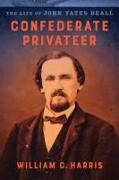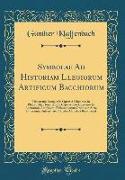Confederate Privateer
BücherAngebote / Angebote:
Confederate Privateer" is a comprehensive account of the brief life and exploits of John Yates Beall of Virginia, a Confederate soldier, naval officer, and guerrilla in the Chesapeake Bay and Great Lakes region. A resident of Charles Town, Virginia (now West Virginia), near Harpers Ferry, Beall was a witness and a militia participant in the trial of John Brown and his execution in 1859. Beall later signed on as a private in the Confederate army and suffered a wound in defense of Harpers Ferry early in the war. He quickly became a fanatical Confederate, ignoring the issue of slavery by focusing on a belief that he was fighting to preserve liberty against a tyrannical Republican party that had usurped the republic and its constitution. After recovering partly from his wound, Beall signed on with Stonewall Jackson's army. However, his weakened physical condition prevented him from joining the unit. Still seeking an active role in the Confederate cause, he traveled to the Midwest and then to Canada, where, among escaped rebel prisoners of war, he developed an elaborate plan for Confederate operations on the Great Lakes. After making his way to Richmond, Beall laid his plan before Confederate President Jefferson Davis and Secretary of the Navy Stephen Mallory, who commissioned him an acting master in the Confederate navy. Instead of the Great Lakes operation, Mallory authorized a small privateering action on the Chesapeake Bay. Led by "Captain" Beall, the operation damaged or destroyed several ships in or under the protection of the United States Navy. For his part in organizing the raids, Beall became known as the "Terror of the Chesapeake." After United States forces captured Beall and his men, the War Department prepared to try them as pirates, a hanging offense. When the Davis administration threatened to execute the same number of Union prisoners, Secretary of War Edwin Stanton backed down. Freed in a later prisoner exchange, Beall returned to the Great Lakes and organized another privateering operation. After some early successes on the water, Beall hatched a plan to derail a passenger train transporting Confederate prisoners of war near Niagara, New York. Captured before he could carry out the mission, the Union army charged Beall with conspiracy, found him guilty, sentenced him to death, and executed him. Harris's history of Beall offers a new lens on paramilitary efforts by civilians to support the Confederacy. It also sheds light on the South's secret operations in neutral Canada to thwart the Union. Though little remembered today, Beall was a famous and heroic figure in the Civil War South. Indeed, so much so that his execution was on John Wilkes Booth's list of reasons to assassinate President Abraham Lincoln. Based on exhaustive primary and secondary sources and placed in the context of more extensive Confederate guerrilla operations, especially in Canada, "Confederate Privateer" is sure to be of interest to Civil War scholars and general readers interested in the conflict"--
Folgt in ca. 15 Arbeitstagen




